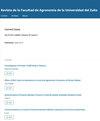脂质过氧化、脯氨酸含量和可溶性糖作为一些高级硬粒小麦品系抗氧化性的指标
IF 0.5
4区 农林科学
Q4 AGRONOMY
Revista De La Facultad De Agronomia De La Universidad Del Zulia
Pub Date : 2023-05-23
DOI:10.47280/revfacagron(luz).v40.n2.08
引用次数: 0
摘要
草甘膦诱导的氧化应激是植物细胞中活性氧(ROS)与抗氧化剂失衡引起的一种复杂现象。本研究在塞提夫农业实验站大田作物研究所(ITGC-AES)进行,评估了部分硬粒小麦品系对草甘膦除草剂诱导氧化应激的反应。抽穗期在旗叶上喷施5 Mm草甘膦溶液,每次测量于施草甘膦48小时后进行。脂质过氧化、游离脯氨酸和可溶性糖测定。结果表明,氧化胁迫增加了旗叶中脂质过氧化、脯氨酸和可溶性糖的含量。方差分析显示,各基因型间差异显著,高级品系G5和G3的脂质过氧化水平升高幅度更大,脂质过氧化和膜损伤程度更大。氧化损伤还增加了G3和G4的脯氨酸含量和G5的可溶性糖含量,表现出对氧化胁迫的高耐受性。本文章由计算机程序翻译,如有差异,请以英文原文为准。
Lipid Peroxidation, Proline Content and Soluble Sugars as indicators of Oxidative Stress Tolerance in Some Advanced Durum Wheat Lines (Triticum durum Desf.).
Oxidative stress induced by glyphosate is a complex phenomenon caused by an imbalance between reactive oxygen species (ROS) and antioxidants in plants cells. The present research was carried out at the field crops institute, Agricultural Experimental Station of Setif (ITGC-AES), to assess the response of some durum wheat (Triticum Durum Desf.) lines exposed to oxidative stress induced by glyphosate herbicide. In the heading stage, a solution of 5 Mm of glyphosate was sprayed on flag leaves, and each measurement was taken 48 hours after the glyphosate application. Lipid peroxidation, free proline and soluble sugars were determined. The results indicated that oxidative stress increased the content of lipid peroxidation, proline, and soluble sugars in flag leaves. Analysis of variance revealed significant differences among the genotypes tested, the increase in the level of lipid peroxidation is much higher in advanced lines G5 and G3, in which lipid peroxidation and membrane damage are greater. Oxidative damage also increased the proline content in lines G3 and G4, and soluble sugars in line G5, which were showing a high tolerance to the oxidative stress induced.
求助全文
通过发布文献求助,成功后即可免费获取论文全文。
去求助
来源期刊
CiteScore
0.50
自引率
0.00%
发文量
45
审稿时长
>12 weeks
期刊介绍:
La Revista de la Facultad de Agronomía de la Universidad del Zulia publica artículos científicos, notas técnicas, comunicaciones rápidas y artículos invitados originales e inéditos, es decir, que no hayan sido publicados ni enviados simultáneamente a otra revista para su publicación, de autores interesados en el campo agrícola vegetal y agrícola animal. De presentarse el caso que el autor o autores hubiesen enviado o publicado su manuscrito simultáneamente en otra revista, podrán ser sancionados con la no publicación en esta revista por tiempo indefinido.
Se admiten manuscritos escritos en idioma Español, Portugués o Inglés, con un resumen en Español o Portugués y otro en Inglés (Abstract).

 求助内容:
求助内容: 应助结果提醒方式:
应助结果提醒方式:


